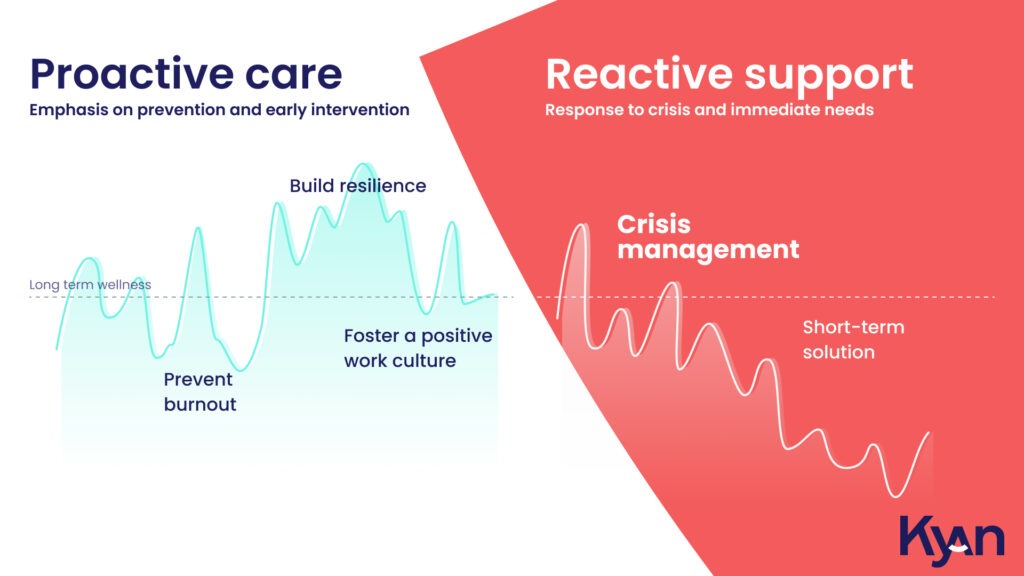How does mental well-being impact individual productivity and overall job satisfaction? What steps can leaders and employees collaboratively take to create a thriving work environment? What proactive solutions does Kyan Health offer to foster a culture of well-being within organisations?
On World Mental Health Day, Kyan Health sheds light on the important topic of mental well-being and its significance in the context of the workplace by answering these essential questions. In this article, we will explore what employee well-being is, why it is important, share important statistics, and discuss the key roles of leaders and employees in fostering well-being. We’ll also delve into the importance of providing the right resources and introduce Kyan’s integrated approach to employee well-being.
What is employee well-being?
Employee well-being is an integral aspect of an individual’s mental health and overall health. It encompasses internal and external aspects, and influences how people feel, think, and act. The World Health Organization defines mental well-being as the state in which an individual can realise their abilities, cope with life’s stresses, work productively, and contribute to their community. It goes beyond the absence of mental illness and emphasises the presence of factors that contribute to a fulfilling life.
Why is employee mental health and well-being important?
Let’s take a look at some statistics:
- 1 in every 8 people in the world live with a mental disorder
- Approximately 280 million people worldwide suffer from depression
- Every year, 800,000 people globally lose their lives to suicide, which is one person every 40 seconds
- People with mental disorders tend to die 20 years younger than the general population
- In 2019, 301 million people worldwide were diagnosed with an anxiety disorder
- Depression and anxiety cost the global economy an estimated $1 trillion, primarily due to lost productivity
These numbers highlight the importance of addressing the topic of mental well-being in the workplace: poor mental health doesn’t just impact individuals; it affects the entire society and economy.
Mental well-being is key for personal fulfilment
On the individual side, poor mental health can affect relationships, decision-making, and the overall work environment. It’s also linked to physical health: research shows that stress, anxiety, and depression can impact the immune system and lead to various physical illnesses such as heart disease, hypertension, or digestive issues. In short, the interplay between mental health and well-being with other aspects of life is undeniable, that’s why it’s essential to prioritise it.
Mental well-being is crucial for organisational success
Organisational success is intrinsically tied to employee performance, which, in turn, depends on employee well-being. Thus, employee well-being is crucial for a variety of reasons, including:
- Lower absenteeism rates: a positive work environment reduces the likelihood of employees calling in sick
- Reduced turnover: employees with good physical and mental health are more likely to stay
- Increased productivity: a positive work culture boosts motivation and, in turn, productivity
- Attraction of top talent: organisations known for their commitment to employee mental health are magnets for future talent
On the other hand, poor mental health at work can lead to a range of negative consequences, including reduced productivity, increased absenteeism, and an unhappy workforce. It can also contribute to anxiety, depression, substance abuse, and more, affecting both employees and the business as a whole.
The role of leaders
Effective leadership is central in establishing an environment that supports and nurtures employee well-being. Leaders have several responsibilities in this context:
- Promote psychological safety: this means creating an atmosphere where employees feel comfortable sharing their thoughts and concerns without fear of judgment or reprisal. When employees are confident that their mental health won’t be stigmatised, they are more likely to seek help when needed and contribute fully to their work.
- Encourage open communication and empathy: leaders should be approachable, actively listen to their team members, and demonstrate empathy towards their struggles. By doing so, they not only gain a better understanding of their employees’ needs but also show that they genuinely care about their well-being.
- Set an example by prioritising their mental well-being: leaders can be role models for their employees by prioritising their own mental well-being. By taking care of their mental health, leaders send a powerful message that it’s acceptable and commendable to seek help and practise self-care. This sets a positive precedent for the entire organisation.
The role of employees
Employees, too, play a key role in nurturing their own well-being, which, in turn, contributes to a healthier work environment. Here are some of the responsibilities of employees:
- Be proactive about seeking help when needed: it’s essential for them to recognise that reaching out to professionals, such as therapists or counsellors, is a sign of strength, not weakness. Additionally, many organisations provide resources and support for this purpose, so taking advantage of these services can make a significant difference.
- Communicate openly with their leaders and colleagues: open communication isn’t a one-way street. Employees should feel comfortable discussing their well-being with their leaders and colleagues. By doing so, they not only create opportunities for receiving support and understanding but also contribute to the overall culture of openness. When individuals share their experiences, it can reduce stigma and encourage others to do the same.
- Practise self-care routines and maintain a work-life balance: employees should establish self-care routines that help them manage stress and maintain a healthy work-life balance. These routines can include activities like regular exercise, meditation, mindfulness, and taking breaks. By engaging in self-care, employees enhance their resilience and ability to cope with workplace challenges effectively.
By taking these proactive steps and working in conjunction with supportive leaders, employees can create a more positive, well-being-centric work environment that benefits everyone involved.
Providing the right resources
In the journey towards fostering employee well-being, the availability of appropriate resources stands as a pivotal factor. Studies underscore the profound impact of leaders investing in employee well-being. According to the WHO, investing in employee mental health yields significant returns. For every $1 spent on addressing common mental health concerns among employees, there is a $4 rate of return in terms of improved overall health and productivity. Research even suggests a remarkable return on investment (ROI) of $5.3 for every $1 invested in mental well-being initiatives, particularly when implementing early, proactive interventions. Adequate resources encompass access to mental health services, robust training programs, and the cultivation of a supportive organisational culture.

Kyan Health’s integrated approach to mental well-being
To tackle the multi-faceted challenge of employee well-being, we at Kyan Health advocate a full-stack approach. This approach addresses the entire spectrum of well-being, from early detection and awareness to personalised self-care and counselling. We partner with organisations to tackle the root causes behind employee turnover and absenteeism. By redesigning workplaces for psychological safety, promoting prevention and early intervention, and basing well-being strategies on data, we aim to achieve lasting change.
On an individual level, our approach combines validated mental health and well-being assessments with evidence-based self-care and improvement programs. We offer access to a network of psychotherapists and coaches, ensuring that support is available in real-time whenever needed. Our solution empowers individuals to become aware of their well-being needs, giving them the tools to address challenges like burnout or skill development. Our programs can be used for self-care or in partnership with a counsellor, embracing a “blended-care” model.
At the organisational level, we provide dashboards for leaders that offer real-time employee data while safeguarding individual privacy. This equips them to create an environment that is not just supportive but also finely aligned with the specific well-being needs of their employees. The Kyan Academy also offers a range of workshops and training programs aimed at changing company culture and fostering a psychologically safe environment for all team members. Our team works closely with each client to enhance engagement, adherence, and overall experience. The result? A comprehensive well-being solution, challenging the root causes, and maximising long-term individual and organisational productivity. We’re here to reshape how mental health is nurtured in the workplace, embracing a future that combines lasting well-being and corporate success.
In conclusion, employee well-being and mental health are not just buzzwords; they are a vital aspect of a thriving organisation. By prioritising mental health, organisations can enhance productivity, reduce turnover, and create a happier, healthier workplace. It’s a shared responsibility between employers and employees to create a culture that fosters mental well-being and supports those with mental health challenges. Kyan Health offers a comprehensive solution to assist employees in managing their mental well-being, ultimately leading to improved productivity, job satisfaction, and a more robust bottom line.
Interested in learning more about Kyan Health? Click here to schedule a demo or visit www.kyanhealth.com to learn more about our workplace mental well-being solutions!
 Kyan Health
Kyan Health



